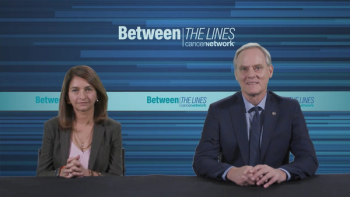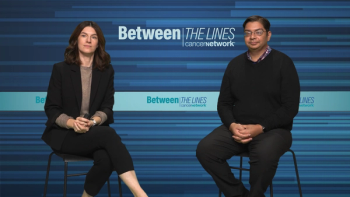
Discussion centers on early dermatologic AEs with amivantamab plus lazertinib, emphasizing prevention protocols and staff education.

Your AI-Trained Oncology Knowledge Connection!


Discussion centers on early dermatologic AEs with amivantamab plus lazertinib, emphasizing prevention protocols and staff education.

Panelists discuss how the decision to offer local consolidative therapy in oligometastatic non–small cell lung cancer depends on multiple factors including PET scan activity at 6 months, the feasibility of rendering patients with no evidence of disease, multidisciplinary collaboration, and the emerging need for a “third box” treatment category beyond curative and palliative intent that addresses preemptive strikes against limited progressive sites to prolong survival.

Combining daratumumab with other agents is one strategy that investigators are exploring in the smoldering multiple myeloma field.

Antibody-drug conjugates are effective, but strategies such as better understanding the mechanisms of action may lead to enhanced care for patients with cancer.

Co-hosts Kristie L. Kahl and Andrew Svonavec highlight what to expect at the 43rd Annual Chemotherapy Foundation Symposium, such as new chemotherapeutics and targeted therapies.

A substantial portion of patients who received daratumumab in the AQUILA study were able to delay disease progression to active multiple myeloma.

Panelists discuss how ADVANCE results show daratumumab-based quadruplets achieve high MRD negativity across risk and age groups in NDMM.

Panelists discuss how the ADVANCE trial’s inclusive design and MRD-based end points make it a model for future NDMM research.

Results showed no “deleterious reactions” with chlorotoxin-directed cellular therapy in a small cohort of patients with recurrent glioblastoma.

Although 1 of 21 patients with liver-dominant NETs died due to RILD in the phase 1 study, no RILD-induced deaths were observed in the phase 2 trial.

A novel CAR T-cell therapy may bind with more avidity, rather than affinity, to glioblastoma cells, said Michael Barish, PhD.


ADCs demonstrate superior efficacy vs chemotherapy but maintain a similar safety profile that requires multidisciplinary collaboration to optimally treat.

Illustrates how osimertinib resistance emerges through diverse EGFR and MET alterations, leading to disease relapse.

The approval of daratumumab validates the notion of using limited therapy to help delay progression from smoldering disease to multiple myeloma.

According to Aditya Bardia, MD, MPH, FASCO, antibody-drug conjugates are slowly replacing chemotherapy as a standard treatment for breast cancer.

A simulation procedure helped to ascertain chemotherapy tolerability before administering radioembolization therapy for NETs with liver metastases.

The addition of radioembolization to radiosensitizing chemotherapy may help concurrently treat patients with liver tumors and disease outside the liver.

In neuroendocrine tumor management, patients with insulinoma may be at risk of severe hypoglycemia following receipt of GLP-1 receptor agonists.

Decreasing the low-dose bath of proton therapy to the body may limit the impact of radiation on lymphocytes and affect tumor response.

The physicians share real-world imaging schedules, triggers for adding local therapy, and lessons from serial MRI data in the MARIPOSA trial.

The panel examines a 59-year-old woman with small brain metastases, addressing therapy selection to balance CNS control, survival, and quality of life.

According to Eyub Akdemir, MD, reducing EDIC may be feasible without compromising target coverage to reduce anticipated lymphopenia rates.

Panelists discuss how the future of brain control in limited-stage small cell lung cancer may trend toward MRI surveillance rather than prophylactic cranial irradiation (PCI) given its toxicity and the availability of effective salvage stereotactic radiosurgery, though survival benefits from historical PCI trials and shared decision-making still support offering hippocampal-avoidant PCI with memantine until definitive data from trials like MAVERICK emerge.

Vickie Baracos, PhD, determined 2 highly coherent molecular subtypes in human muscle from patients with cancer at risk of cachexia.

Panelists discuss how the ADVANCE study was structured to determine whether adding daratumumab to KRd enhances depth and durability of response in NDMM.

Panelists discuss how comprehensive diagnostic and functional pretesting ensures safe and effective initiation of quadruplet therapy in NDMM.

212Pb-DOTAMTATE showed “unexpectedly good” outcomes among those with gastroenteropancreatic neuroendocrine tumors, said Mary Maluccio, MD, MPH, FACS.

Experts discuss applying emerging evidence from MARIPOSA and FLAURA2 to first-line decision-making in EGFR-mutated disease.

Misako Nagasaka, MD, PhD, Dr. Nagasaka introduces the panel and outlines the session’s focus on applying new EGFR-mutated NSCLC data to practice, with emphasis on CNS control and toxicity prevention.